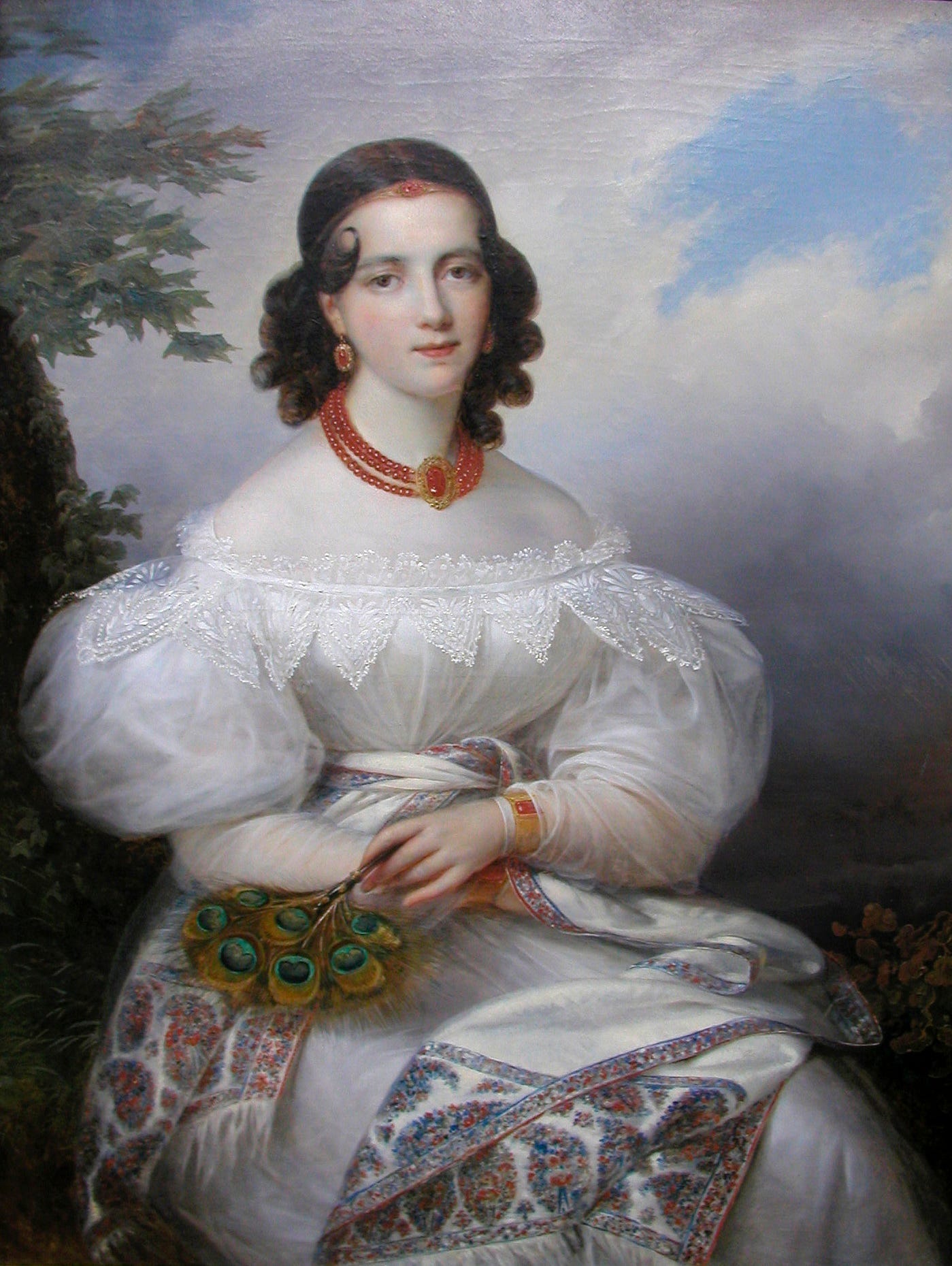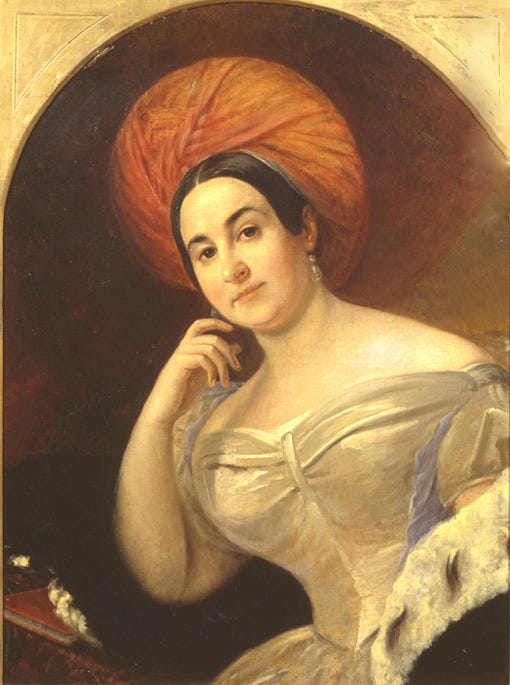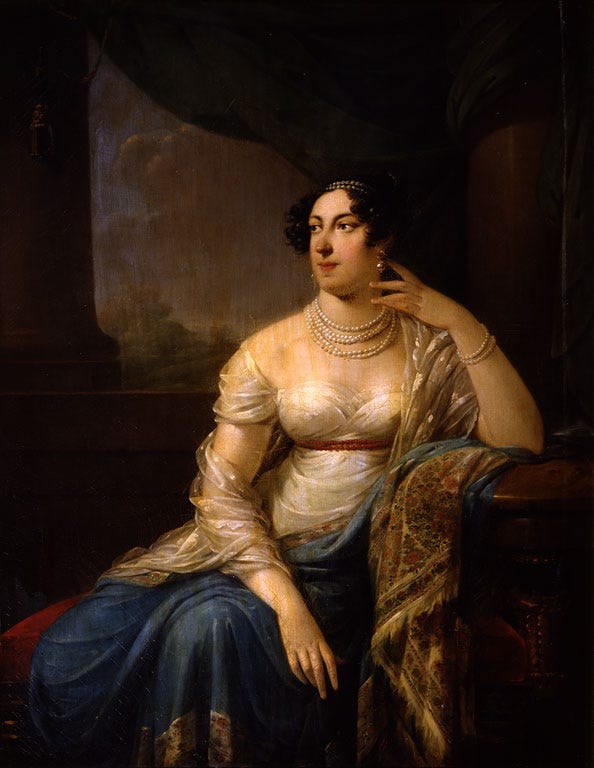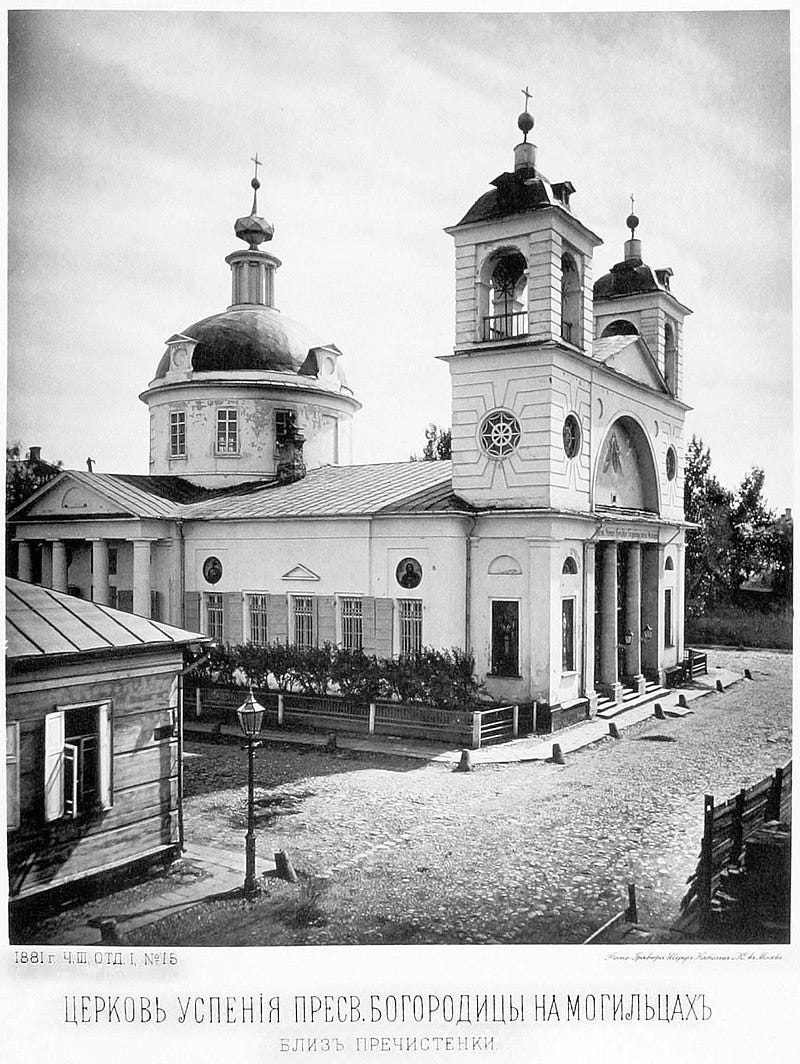Welcome to week 22 of War and Peace 2024. This week, we have read Book 2, Part 5, Chapters 6 – 12.
Everything you need for this read-along and book group can be found on the main War and Peace page of Footnotes and Tangents. There you will find:
The reading schedule with links to daily chat threads for each chapter.
Weekly updates like this one.
These resources are free for all, thanks to the generosity of paying subscribers who support my writing and this slow book group. Paid supporters have access to All Tolstoy’s parties: every ball and banquet, reviewed, rated and ranked. You can also start your own discussion threads in the chat area. Thank you so much for your support!
This is a long post, and your email provider may clip it. It is best viewed online here.
This week’s theme: Natasha’s battlefield
Never has peace felt more like war.
Nikolai left the safe comfort of the Rostov nursery for the confusion, terror and disappointment of war and battle. Natasha leaves the magical idyl of Otradnoe for the temptations of the city lights. Moscow is her Schöngrabern and Austerlitz. Moscow is Natasha’s battlefield.
Nikolai believed everyone loved him until he met Frenchmen trying to kill him, and Dolokhov intent on his ruin. Natasha assumes the same. She is not ready for the Bolkonskys and the Kuragins of this world.
Alone on the battlefield, Nikolai turned to father figures and role models: Denisov, Dolokhov and the Tsar. In Moscow, chaperoned by a clueless father, Natasha is no less isolated. Her guardian angels are the dragon Marya Dmitrievna and the fascinating Hélène.
Like her brother before her, she thinks she is invincible. Hélène makes her feel special, and Anatole makes her feel admired. She goes into the Kuragin den, like her brother, sitting down with Dolokhov. She feels the thrill of being a player, when all the time, she is being played.

Chapter 6: The house of the dragon
In Moscow, Count Rostov, Natasha and Sonya come to stay with le dragon terrible, Marya Dmitrievna. She takes the girls under her wing to ‘scold them a bit, and pet them a bit.’ We learn that she thinks highly of the Bolkonskys and has been asked by Marya to bring the two future sisters-in-law together. To that end, Natasha and her father are to visit the Bolkonsky house tomorrow.
Sonya • Natasha • Marya Dmitrievna • Count Rostov
Marya Dmitrievna is a very popular minor character. What makes her so appealing?
Everyone appears to be descending on Moscow. What reunions or encounters are you looking forward to most?
The dragon is back
In case you have forgotten Marya Dmitrievna, she was the formidable woman who danced the Daniel Cooper with Count Rostov back in 1805, wagged her finger at Natasha the naughty ‘Coassack’, and told everyone that ‘you may die in your bed or God may spare you in a battle.’ Her words proved accurate for the newlywed couple, Andrei Bolkonsky and his wife, Liza.
Tolstoy’s portrait of her is exquisite:
She held herself erect, told everyone her opinion as candidly, loudly, and bluntly, as ever, and her whole bearing seemed a reproach to others for any weakness, passion, or temptation—the possibility of which she did not admit. From early in the morning, wearing a dressing-jacket, she attended to her household affairs, and then she drove out: on holy days to church, and after the service to jails and prisons on affairs of which she never spoke to anyone.
I want to follow her to those jails and prisons to see what she says and does. But she’s not telling anyone, let alone Tolstoy.
It’s no surprise to me that she is a fan of the Bolkonskys. Like Pierre, she is unusual in having feet in both camps. Like Nikolai Bolkonsky, she is a creature of the late eighteenth century, learned and strong-willed, with forceful opinions. I can see her and the old prince sitting up late, shaking their heads at the state of the world and the folly of new men.
Chapter 7: Sister Blisters
The count and Natasha visit the Bolkonskys. Ilya Rostov is afraid and makes his excuses to avoid an encounter with the terrifying prince. An optimistic Natasha and a nervous Marya have a stilted conversation in the obstructive presence of Mademoiselle Bourienne. The two women are united in forming negative opinions of each other based on appearances. Later, Sonya comforts a sobbing Natasha and Marya Dmitrievna pretends not to notice Natasha’s distress.
Natasha • Marya • Mademoiselle Bourienne • Prince Bolkonsky • Count Rostov • Sonya • Marya Dmitrievna
The world loves you
Do you remember Nikolai, on the field of Schöngrabern?
‘Who are they? Why are they running? Can they be coming at me? And why? To kill me? Me who everybody loves?' He remembered his mother’s love for him, and his family’s, and his friends’, and the enemy’s intention to kill him seemed impossible.
And here is Natasha on her way to see her future father and sister-in-law:
‘They can’t help liking me,’ she thought. ‘Everybody always has liked me, and I am so willing to do anything they wish, so ready to be fond of him—for being his father—and of her—for being his sister—that there is no reason for them not to like me…’
Both young Rostovs were raised in a house full of love, and within that safe cocoon, it is impossible to imagine a world that hates you. And they are not bad people and they are eager to be loved. So surely, all shall be well? Tolstoy shows them that it is not so simple.
An apparition
‘Ah, madam!’ he began. ‘Madam, Countess … Countess Rostova, if I am not mistaken … I beg you to excuse me, to excuse me … I did not know, madam. God is my witness, I did not know you had honoured us with a visit, and I came in such a costume only to see my daughter.’
In our daily chat, we had a fascinating discussion about Bolkonsky’s appearance in this chapter. Every time I read this, I note the stark contrast between Rostov’s fear of the prince and this frail shade of a man in his dressing gown and white nightcap. His broken speech, his uncharacteristic invocation of God, and his stammering apologies all strike me as signs of mental instability.
Other readers are less generous. This is the prince up to his old tricks: interfering and prying into his daughter’s affairs. He knew Natasha was there and first insulted her by refusing to see her and then again by lying to her face.
Both readings are plausible. But I think what is even more interesting is that they are not mutually exclusive. We know he is a tyrannical father, and we know he is increasingly ill. His actions are a combination of intention and confusion. As we saw when Anatole visited Bald Hills, Bolkonsky is a man who believes his actions are fair and rational. In fact, he is ruled by his heart in all things. Love for his daughter and fear of losing her.
And as we readers try to make sense of the man, we find ourselves in the same bind as Marya and all others who care for sick relatives. We try to separate out the man from the disease, and discover we can do no such thing. It is an intractable problem, and one Tolstoy forces us to confront in this disturbing ‘apparition’.
This was a missed opportunity for both Natasha and Marya. What could they have done differently?
Why do you think the old prince interrupted them? And what role, if any, does his illness play in his actions?

Chapter 8: The boys are back in town
That same evening, Marya Dmitrievna takes the Rostovs to the opera. There, we see the betrothed Julie and Boris, his mother and her head-dress. Dolokhov is back, styling himself as ‘The Persian’ and turning heads with his pal Anatole. Natasha finds all the attention ‘agreeable’ and ‘disagreeable’ and is distracted by an enchanting Hélène.
Sonya • Natasha • Count Rostov • Anna Mikhailovna • Boris • Julie • Shinshin • Dolokhov • Hélène
Why does Natasha find all the attention both ‘agreeable’ and ‘disagreeable’?
We see this scene through Natasha’s eyes. What do you think Julie and Sonya are thinking?
Back from his gap year, having killed the Shah’s brother (wait? what!), Dolokhov is styling himself as the Persian. And with Anatole, he is turning heads and raising red flags all over Moscow. And Natasha is falling in love with Hélène. What. Could. Go. Wrong? Special shoutout to Anna Mikhailovna and her headgear, magnificently photo bombing her son’s betrothal opera box with her studied “happy look of resignation to the will of God” on her face. Give that woman an Oscar.

Chapter 9: Adjutant Anatole
Natasha watches the opera in amazement; it all seems ‘so pretentiously false and unnatural’ to her. Anatole appears in uniform and looks splendid. Hélène offers to ‘amuse’ the Rostov girls in Moscow and invites Natasha into her box. Under the Kuragin spell, everything, including the bad opera, no longer appears strange but delightful.
Natasha • Sonya • Count Rostov • Hélène • Anatole • Dolokhov • Boris • Pierre
Did Natasha’s response to the opera surprise you?
Hélène says what she doesn’t think. So, what does she think of Natasha?
Tolstoy on opera
Andrei entered Natasha’s life with a moon so brilliant she desired wings to fly to it. Anatole jangles in before a cut-out canvas moon in a bad opera.
In a letter to his wife in 1864, Tolstoy wrote:
I went to the theatre. I got there at the end of the second act. Fresh from the country it always seems to me bizzare, forced and false; but when one gets accustomed to it, it again pleases one.
That juxtaposition is experienced by us, the readers, chasing Natasha from the folk dances and mummery of Otradnoe to the stilted fakery of the Moscow opera. Natasha, like Tolstoy, becomes accustomed to it and ends the chapter smiling joyfully. But the reader is left behind, or perhaps is sitting up in the gods, watching a tragedy unfold.
It is perhaps no surprise to learn that while Tolstoy liked folk and gypsy music, he had no love for the opera. In What is Art?, he devotes an entire chapter to critiquing one opera by Wagner. For Tolstoy, this was an inauthentic form of art, an unhappy marriage of music, drama and dance.
In an ironical twist, War and Peace was adapted for opera in 1946 by Sergei Prokofiev. In 2012, Natasha, Pierre & The Great Comet of 1812 premiered in New York. This adaptation of War and Peace covers the story of this week and next week’s chapters. And yes, it includes the opera scene:
Chapter 10: A sort of devil
With a ‘whiff of cold air’, Anatole joins Natasha in Hélène’s box. She feels his proximity intensely and his eyes on her. He invites her to a party at the Kuragins and all she notices of the rest of the performance is a sort of devil falling through a trapdoor. At home, alone, she cannot fathom whether something terrible has happened, or nothing at all.
How would you help Natasha answer her troubled questions at the end of this chapter?
Anatole • Hélène • Natasha • Count Rostov
Anatole on Moscow:
'At first I did not like it much, because what makes a town pleasant are the beautiful women, isn't that so? But now I like it very much indeed.'
Is this chatup line good because it is so bad, or bad because it is so good?
This chapter is chilling to read. Through Natasha, we experience the first flush of sexual attraction mixed with the creepy chill of predation. It is perfectly poised: Anatole is handsome and charming but terrifyingly carnivorous. No wonder Natasha is left tortured with conflicted feelings of excitement and terror.

Chapter 11: A fraternity of villains
Anatole had been sent to Moscow by his father, who was keen to see him wed. He stayed with Pierre, took his money and spent it freely, mostly on gipsy-girls and French actresses. When Dolokhov turned up in town, he made use of Kuragin to attract rich men to his gambling set. Natasha is ‘first-rate… but not for us’ he warns Anatole. He reminds Kuragin that he has already once made the mistake of chasing unmarried young women. Two years ago, in Poland, a landowner forced him to marry his daughter.
What are Anatole’s intentions?
Who is the greater villain: Anatole or Dolokhov?
Two kinds of rogue
Apart from the advantage he derived from Anatole, the very process of dominating another’s will was in itself a pleasure, a habit, and a necessity to Dolokhov.
We are told that Anatole is not a gambler or ambitious, and he is neither mean nor vain. He is handsome, generous, and confident. He seeks pleasure and is incapable of considering the consequences. He is entitled, convinced that, ‘as a duck is so made that it must live in water, so God had made him such that he must spend thirty thousand rubles a year and always occupy a prominent position in society.’
Dolokhov is an adventurer, a schemer, a manipulator. He loves taking risks and will cheat to win. He told Nikolai he does not have friends but only enemies and those he can use. And Anatole is a man he can use. Not that Anatole minds much, as long as he is having a good time.

Chapter 12: Dangerous Liaisons
The day after the opera, Marya Dmitrievna goes to visit old Bolkonsky on Natasha’s behalf but returns defeated and agitated. Meanwhile, Hélène visits, compliments Natasha and invites her to Mademoiselle Georges’ recitation. She tells Natasha that Anatole is ‘madly in love’ with her. While Marya Dmitrievna doesn’t care for Bezukhova, she tells Natasha to go and ‘divert your thoughts.’
Natasha • Hélène • Marya Dmitrievna • Count Rostov
We mostly know Hélène throw Pierre’s eyes. Do these chapters change how you see her?
What happened between Marya Dmitrievna and the old prince Bolkonsky?
Absent and surrogate parents
This week, two women promise to take Natasha under their wing: the fearsome Marya Dmitrievna and the fascinating Hélène. The two surrogate parents couldn’t be more different. Earlier in the book, Hélène is described ironically as a “bluestocking” for her intellectual gatherings. The term is probably more appropriate for the bespectacled, well-read dragon with her good works and no-nonsense. At this point in the story, it is unclear which will have the greater influence over the impressionable Natasha Rostova.
Her mother is unwell and absent at Otradnoe. Her father has proved worse than useless so far, a coward who cannot protect his daughter from either the Bolkonskys or the Kuragins.
This situation of absent and surrogate parents is similar to Nikolai’s experience of war. Far from home, he looks to people like Denisov and then Dolokhov for role models and father figures. For Nikolai, it ends in disillusionment and despair. Will Natasha fair any better on her own battlefield?
Thank you for reading
Thank you for reading and joining me on this slow read of War and Peace.
A quick reminder that this book group is entirely funded by its readers. So, if you have enjoyed this post and found it helpful, please consider a paid subscription to access the bonus reviews of all the parties of War and Peace and start your own discussion threads in the chat area. You can also donate to my tip jar on Stripe. Thank you so much for all your support.
And that’s all for this week. I would love to hear your thoughts in the comments. Have a great week, and I’ll see everyone here next Sunday for more War and Peace 2024.




Am I the only one who was bemused or frustrated with Natasha's fickleness in these chapters? How quickly she goes from pining for Andrei to losing her heart (or mind?) to Anatole. Ah, youth.
These weekly summaries are so useful. Thank you Simon, for all the work you put in to them.